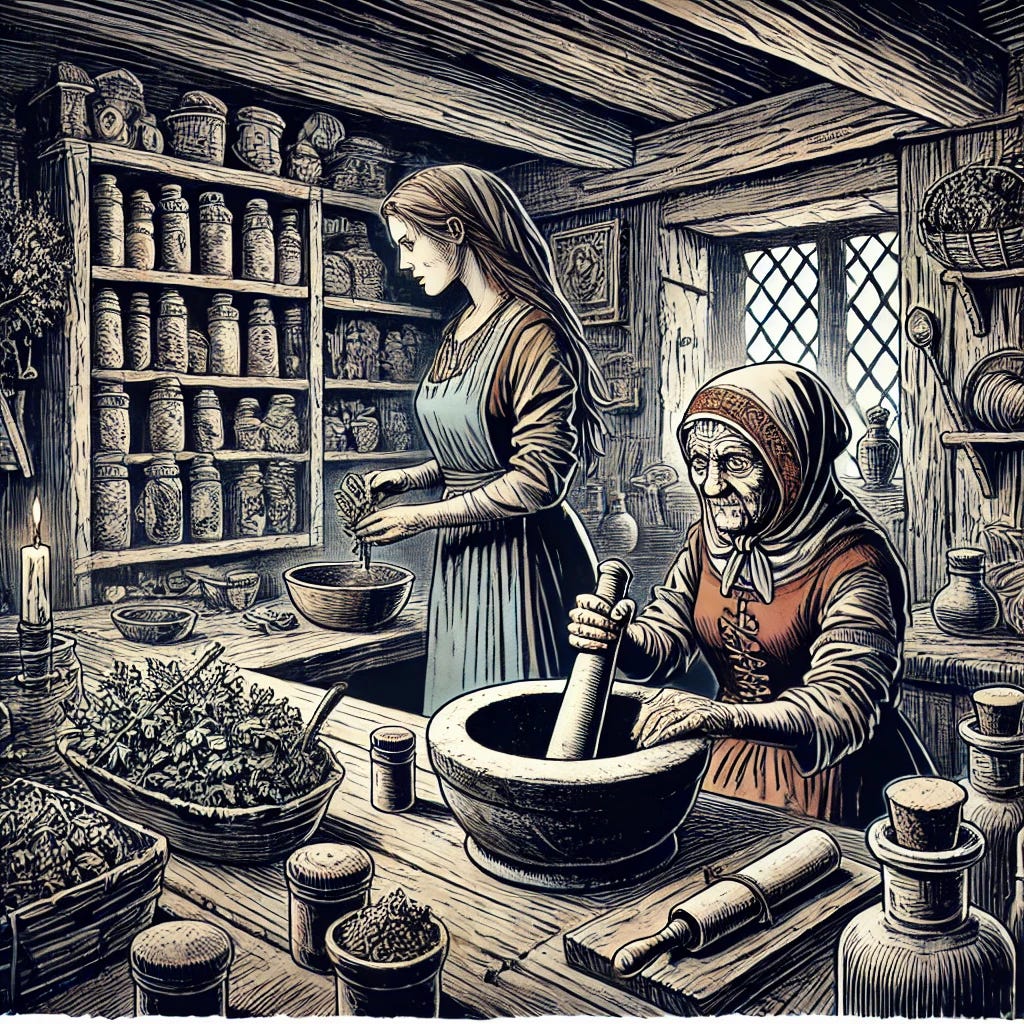Writing came about some time in the last few thousand years, but for most of our 300,000 year existence, we’ve passed down knowledge orally.
Most of this work fell to the older members of the community, to those who had acquired some legitimate wisdom over their decades of life. Men and women had sharply defined roles, with men doing most of the hunting and women gathering and doing most of the domestic work—it’s not really quite that simple, but for today, it’s a working model of how things really were.
Naturally, women might have a slight advantage in terms of longevity simply due to men going out and getting killed more, but there was even more to it than that. Women also tend to have stronger immune systems than men, with estrogen playing a key role.
Older women, then, were keepers of all sorts of domestic knowledge. Domestic might sound trivial today, but we’re talking about everything around and inside the home, and that includes developing a functional understanding of how the world works. We’re not talking about science here, but we are talking about carefully collected observations that have been crafted into useful knowledge over the generations.
These oral traditions were predominantly shared by women for all of the reasons I mentioned, but also because a virtuous cycle arose where older women had knowledge and were worth protecting just for that reason. Older women were the Wikipedia of the Paleolithic Era.
Now, fast forward a few hundred thousand years, and you have the cusp of the Mesolithic Era, where folks began to settle down quite a bit. Older women were still the keepers of much tribal knowledge including obvious stuff like cooking and preserving food, but also less obvious things like how to grow crops, or long term weather cycles that determined when different sources of food might disappear for a few months.
If you knew how to repair a broken arm or how to plant a seed, you probably heard this directly from an older woman.
Today, people will sometimes refer to something based on superstition or misinformation as an old wives’ tale. The fact that the term is pejorative tells us plenty.
For one thing, men came to dominate society in ways unimaginable to our paleolithic ancestors. Social structures changed to accommodate farming and sedentary living, and women’s role became gradually relegated more and more to the home—less foraging for food, more of men plowing fields.
What had once been considered useful information was now relegated to ancient traditions, some of which were now being debunked. As more and more information crept out into the wider world through writing, more superstitions were debunked.
Now, knowledge had another way to spread. Now, the role of women as keepers of knowledge began to be perceived as less important.
That’s just an old wives’ tale, we might say. We might wave our hands at the superstitious silliness of something that’s easily proven to be false. We might think about old women propagating silly lies when we say it. We might have a tendency to generalize this about older women.
We might end up making the world worse by propagating this term.
Folk remedies are often dismissed out of hand as old wives’ tales, but every now and then, one of them turns out to be legitimate. Pharmaceutical companies will scramble for the dollar signs from this new discovery, but it turns out it’s been around for thousands of years (or more).
Aspirin was synthesized in a lab, but ancient civilizations like Egypt and China already knew that willow bark could be used for pain relief and to treat inflammation. In 1899, the Bayer company patented acetylsalicylic acid, a new wonder drug synthesized from the active ingredient found in willow bark. This old wives’ tale became a multi-billion dollar business.
Similarly, honey has long been understood to have medicinal properties. 20th century wisdom dismissed honey’s medicinal benefits as oversold claims based on old wives’ tales, but it turns out that honey’s antibacterial properties are due to the presence of hydrogen peroxide.
Science has caught up with a few old wives’ tales by now. Do you know any of these sorts of stories? Can you think of any good examples of folk wisdom that turned out to have merit?






Great article. Reminds me of this quote: “Tradition is a set of solutions for which we have forgotten the problems. Throw away the solution and you get the problem back.” — Donald Kingsbury
Traditions are a very similar thing to the wives tales. Somtimes they are useful, sometimes they are not, but it helps us to understand why they exist.
https://www.polymathicbeing.com/p/tradition
Cracked.com (back when it was pretty awesome) once did a whole roundup of Old Wives' Tales that have been confirmed by science: https://www.cracked.com/article_20176_5-old-wives-tales-about-health-confirmed-by-science.html